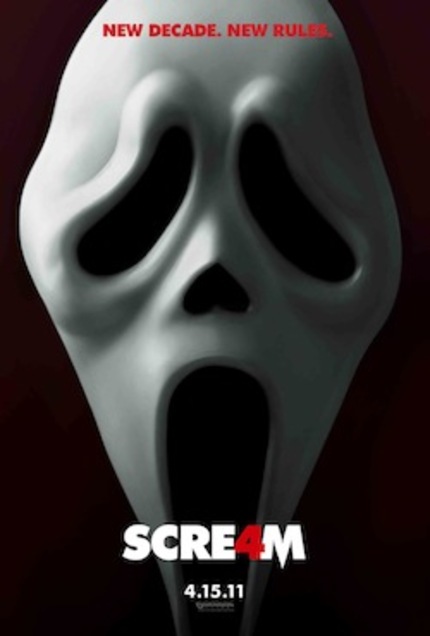Much Ado About Meta: SCREAM 4 in a New Era

That's the feeling I had when watching Scream 4; the filmmakers appear to have been short on creative currency and simply starting mashing things together. Writer Kevin Williamson mashes together a sequel, a remake, and a reboot, sprinkles liberal references to the "meta-ness" of it all, and turns it over to director Wes Craven, a former college professor who never got the non-horror movie career that he wanted. Pale, weak tea as a horror movie, Scream 4 nonetheless has enough fan service to please ardent devotees of the series.
Rather than delve further into the woeful shortcomings of the film, whose pluses and minuses are discussed in multiple reviews here on ScreenAnarchy, it seems timely to consider the one interesting thought it does inspire: When is meta enough?
"Meta" gets tossed around lazily in Scream 4 as an excuse for its wearisome recycling of exhausted stereotypes. (For good measure, it name checks nearly every horror movie ever made, as if to suggest that it's simply not possible to come up with anything fresh or exciting, so stop bothering me about it!) Oxford American Dictionary defines "meta" as "(of a creative work) referring to itself or to the conventions of its genre; self-referential." The first Scream took a standard slasher flick and made it fresh with its mocking references to the genre. To the extent it worked as a horror movie, it was due to Craven's ability to make those stereotypes spooky and shocking.
Of course, since Scream was released in 1996, we've had truly meta films like Adaptation and Stranger Than Fiction, which explore the relationship between fiction and reality, and Perfect Blue and Mulholland Dr., which blur the line between dreams and reality. * So the environment for meta movies has changed, with more and more filmmakers erasing the conventional boundaries between surreal fantasies and straight narratives. Audiences, the smart ones at least, welcome genre-busting fare that doesn't color within the lines. A horror film that was truly wild and took its inspiration from something other than the worst slasher conventions of all time would be received much more favorably by the mainstream nowadays, especially when it features the surviving stars of the original series.
Craven ventured into meta territory before, with the superior Wes Craven's New Nightmare in 1994, featuring Freddy Krueger breaking into the "real" world. That, at least, made the effort to try new things and re-examine what it was that made Freddy such a pop culture phenomenon. And Craven made the scary scenes bloody and spooky and suspenseful, so that die-hard horror fans didn't feel cheated.
Scream 4 proves conclusively that meta is not enough, not when you have a remake/reboot that pays obeisance to its original by framing it as a sequel. (It's rated R in the US, which allows for much blood and even some intestines, if no genuine suspense or thrilling moments of discovery.)
Perhaps Craven and Williamson needed to revisit 1953. No, not to gather ideas for a prequel, but to watch Duck Amuck on a movie screen for the first time. The Chuck Jones cartoon, as you'll recall, starred Daffy Duck and broke down the barrier between subject and creator. Short as it was, Duck Amuck had more heart, humor, imagination -- and true "meta-ness" -- than the entirety of Scream 4.
* P.S. (Added): The best recent example is Rubber, which takes a meta approach to horror and then actually does something quite fascinating -- and entertaining -- with it.

Do you feel this content is inappropriate or infringes upon your rights? Click here to report it, or see our DMCA policy.






